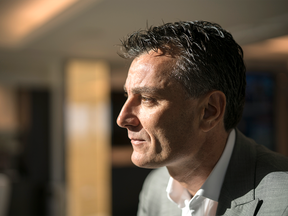
Manulife Terminates Gori’s Employment Without Notice Prior to His Requested Retirement
A Surprise Retirement Announcement
In a surprise move, Manulife Financial Corp.’s chief executive Roy Gori has announced his retirement, effective May this year. This news came as a shock to some investors, who were not expecting such an early departure.
The Reasons Behind His Decision
In an interview, Gori explained that he never wanted to stay in the job so long that people started wondering why he just wouldn’t leave. He cited Vijay Merchant, a famous Indian cricketer, for inspiration on this front. According to Gori, Merchant once said, "Retire when they ask you, Why?, not Why not?" Gori stated that he is humbly hoping that more people are asking "Why?" for him.
A Strong Successor and Business Momentum
Gori mentioned that the conditions were right for his retirement. He explained that Manulife has a strong successor lined up to take over in May, Phil Witherington, 47, who is currently head of the Asia division. The firm also has "great business momentum," in part from a series of deals to de-risk its balance sheet.
Reinsurance Deals and Capital Release
Manulife just signed a third such accord in the span of less than a year with Reinsurance Group of America agreeing to reinsure $5.4 billion of reserves. This transaction will allow Manulife to release $800 million in capital, which it plans to return to shareholders through buybacks.
Gori listed off the transactions that began with a record deal to reinsure $13 billion of reserves with KKR & Co.’s Global Atlantic Financial Group, followed by plans to reinsure $5.8 billion of Canadian policies with RGA Life Reinsurance Co. of Canada. "When you take all of those three combined, we reinsured $24 billion worth of reserves," he said.
In the process, Gori stated that Manulife cut its long-term care reserves by about 20%, freed up about $3 billion in capital, and improved its return on equity. Reinsurance deals lead to lower core earnings as the insurer no longer books revenue from the policies. However, offloading assets with a low return on equity improves overall profitability and cuts the amount of capital Manulife must hold under regulatory rules.
Stock Boost
Manulife shares gained 1.4% to $45.66 on Thursday, bringing its total return this year including dividends to more than 60%. Scotiabank analyst Meny Grauman wrote in a report that the follow-on transaction was well-telegraphed but still involved lingering doubts on management’s ability to get it done.
"It’s significant that they succeeded, and that the move involved a younger cohort of long-term care reserves than last year’s deal, which means it will cover a longer period of liability," Grauman said. He believes that this transaction will help drive Manulife’s valuation higher and further validates his still-bullish thesis on this name.
Analyst Reaction
Bloomberg.com reported that while analysts do not see Manulife shares reacting as dramatically to this deal as it did after December’s announcement, they think it will still help drive Manulife’s valuation higher. This news has been welcomed by investors, who have seen a boost in the company’s stock price.
Conclusion
Gori’s retirement and the recent reinsurance deals are expected to have a positive impact on Manulife’s business performance. The company is well-positioned for future growth, with a strong successor lined up and a solid business strategy in place. As Gori prepares to leave his position, investors are looking forward to seeing the next chapter in Manulife’s story.


